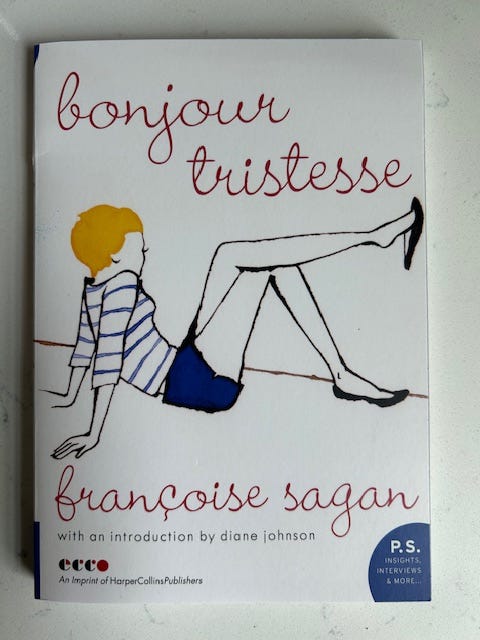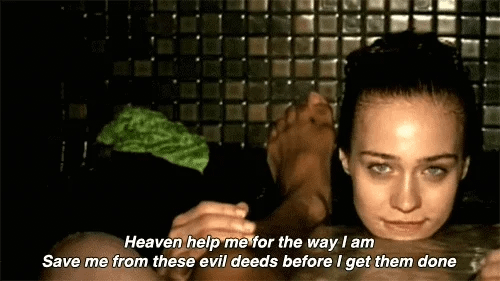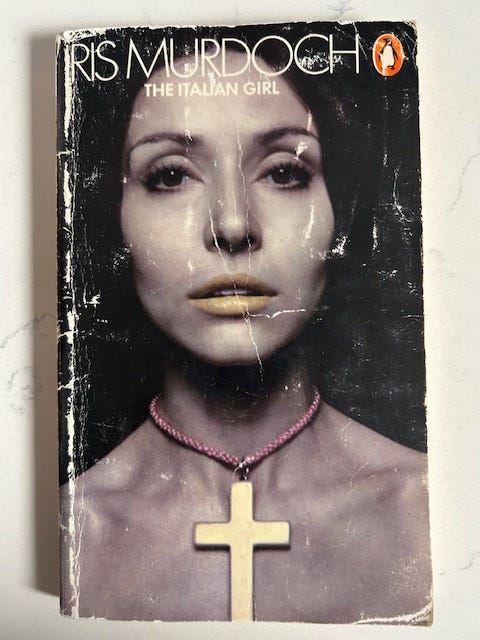'Bonjour Tristesse' by Françoise Sagan'That summer returns to me with all its memories.'—Review #238
Though written decades ago, Françoise Sagan’s novel ‘Bonjour Tristesse’ is a cautionary tale about what can happen when brat summer goes too far. ‘Brat,’ in this case, draws from both the traditional definition of the word and Charlie XCX’s recent coinage as the story follows a young and spoiled teenage girl who spends a summer on the French Riviera making bad decisions and getting into all sorts of drama. Here’s the book’s cover:
Cécile is 17 and lives a carefree life in Paris with her wealthy father, Raymond, after years spent at a convent school. Raymond is a 40-year-old widower and successful businessman who enjoys an endless parade of mistresses. As the novel opens, he has rented a house with a private cove on the southern coast of France where he, Cécile and his latest young-lady friend, Elsa, intend to spend the summer swimming, sunning and relaxing. Soon after they arrive at the vacation house, Raymond informs Cécile and Elsa that another woman is coming to join them. Anne, a beautiful and strong-willed friend of Cécile’s late mother, was apparently in need of a vacation and, when Raymond extended an off-the-cuff invitation, she accepted. Cécile sees trouble immediately. How are Elsa and Anne going to get along? How will Anne, who briefly filled in as a motherly presence years earlier, interfere with Cécile’s summer plans? Will she push her to study for college entrance exams and read boring philosophy? Will she force her to stay away from Cyril, the cute twenty-something law student with a cool boat who lives down the beach? She says to her father: Anne arrives in her big car, and tensions rise. Elsa is jealous and lords her romantic relationship with Raymond and her youth over Anne, who’s older, elegant and more sophisticated. Cécile is forced to limit her beach time and crack those philosophy books after Anne learns the teen bombed her exams and hasn’t been studying. Anne also learns about Cyril, and warns Cécile not to get too involved with him. One night, Raymond, his daughter and the two women go to the casino at Cannes. When Raymond and Anne disappear, Elsa and Cécile search for them—annoyed. Cécile finds the pair having an intense conversation. They tell her they’re going back to the house, and that she should go find Elsa and come home with her later. Cécile is shocked, and after she relays a sanitized version of this story to Elsa, the mistress storms off. The following morning, Raymond and Anne tell Cécile they plan to marry. Cécile’s shock escalates into distress. She had enjoyed her freedom with her father, who was more of a drinking buddy than a parent or taskmaster. Anne’s presence will change her home forever, restrict her. Cécile’s like:
She crafts a plot to break up the new couple that involves Elsa and Cyril. Although Cyril is madly in love with Cécile (and they’ve been having a secret liaison), she instructs him to pose as Elsa’s new lover. The two of them are to take Cyril’s boat and casually cruise past Cécile’s villa’s cove where her father can see them. The sight of the young couple will ignite Raymond’s jealousy and vanity; he’ll dump Anne to get Elsa back. While plotting, Cécile grapples with inner turmoil. On the one hand, she wants to be rid of Anne and her impending discipline. On the other, she knows she’s being irrational and ridiculous: Anne is a good person who would be a positive influence both on her and her father. Hmm, on second thought, perhaps Cécile has less Charlie XCX energy and more Fiona Apple ‘Criminal’ energy:
Cécile narrates this story several years after the events of that summer and the serious consequences that resulted from her actions. I won’t give it away, but the outcome is unexpected and haunting. It had me like: I greatly enjoyed ‘Bonjour Tristesse.’ Sagan’s writing is crisp and sharp, and I flew through it. I love that Sagan was only 18 when she wrote this book, not much older than her protagonist, and that she was able to give Cécile a fascinating and complex interior life. I was riveted to her journey—you guys know I love stories full of drama and gossip. And I love the telling details Sagan wove into the narrative. For example, red-headed Elsa constantly struggles with sunburn on her fair skin, unlike Raymond and Cécile who tan easily. It’s a subtle way to show she’s an outsider, an interloper. (I felt bad for Elsa because I am similarly allergic to sunshine.) ‘Bonjour Tristesse’ is a perfect novel to read in August. Of course, it’s set in summer and, at just 130 pages, it fits our theme for a short-book season. But August is also Women in Translation month. So if you’re looking for translated fiction that’s also a quick read suited for a late-summer break, be sure to check out this book. I highly recommend it. An opening excerpt:
My rating:
‘Bonjour Tristesse’ by Françoise Sagan was originally published in English by E.P. Dutton & Co. in 1955. Translated from the French by Irene Ash. It was published by Ecco in 2001. 130 pages. $15.81 at Bookshop.org. What’s next:Next week, we’ll host a discussion thread. The following week’s newsletter will feature a roundup of random books I read this summer, including the one you chose in last week’s poll: Before you go:
Thanks for reading, and thanks especially to Donna for editing this newsletter! Until next time, MPV
|












